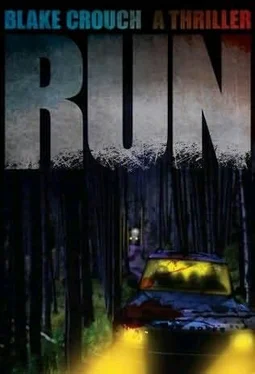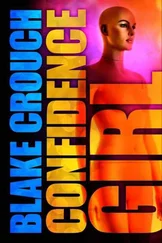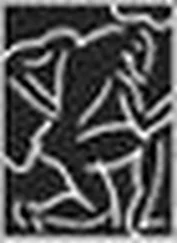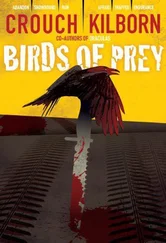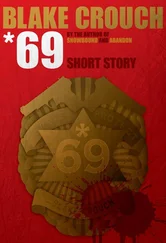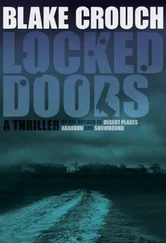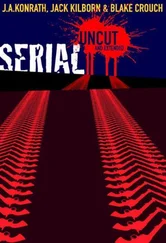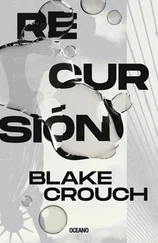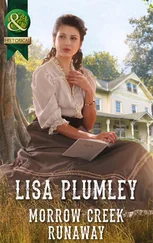Jack struck the man at fifty-five. The Rover shook violently for several seconds, as if running a succession of speedbumps, and then the pavement flowed smoothly under the tires again.
He killed the lights and pushed the Rover past a hundred, watching Dee’s side mirror for tailing cars. When the road made a sharp turn, he slowed and eased off the shoulder down a gentle embankment and turned off the car.
Cole wept hysterically.
“It’s okay, buddy,” Jack said. “It’s okay. We’re all right now.”
“I want to go home. I want to go home now.”
Dee climbed into the back and swept the broken glass off the leather seat and took Cole up into her arms.
“I know,” she whispered. “I know. I want to go home, too, but we can’t just yet.”
“Why?”
“Because it’s not safe.”
“When can we?”
“I don’t know yet.”
Jack glanced back and before the overhead light cut out, saw Naomi’s chin quivering, too.
He opened his door, said, “I’ll be right back.”
He crawled through the grass up the embankment and lay on his stomach in the shadow of an overhanging cottonwood at the shoulder’s edge, his heart beating against the ground, listening. He could still hear Cole crying, Dee hushing him like she had when he was a baby. He wiped his eyes. Hands shaking. Cold. The highway silent.
They came so suddenly he didn’t have time to roll back down the hill-two cars tearing around the corner, no headlights, tires squealing, one of them passing within a foot of his head.
They raced on into darkness, invisible, the groan of their engines slowly fading.
Jack had dust in his eyes and grit between his teeth and the odor of burnt rubber was everywhere.
* * * * *
AT dawn, they entered the largest city they’d seen since Albuquerque. The lights were still on. Gas stations beckoned. They undercut an empty interstate, Jack keeping their speed above sixty, and soon the city dwindled away behind them, him watching the image of it shrink in the only reflection left-the cracked side mirror on Dee’s door.
They crested a pass. A small weather station beside the road. Fragile light on this minor range of green foothills. That city thirty miles back and to the south, its lights glittering in the desert. A distant range to the west with still a few minutes of night left to go. Jack was beyond exhaustion, shoulder aching from the twelve-gauge kick, his children awake, staring into the plastic of their respective windows. Catatonic. Dee snored softly.
They rode down from the pass and out of the pines into empty, arid country. As the sun edged up on the world, Jack saw the building in the distance. He took his foot off the accelerator.
The motel had been long abandoned, its name bleached out of the thirty-foot billboard that stood teetering beside the road. Dee stirred and sat up as Jack veered off the highway onto the fractured pavement.
“Why are you stopping?”
“I have to sleep.”
“Want me to drive some?”
“No, let’s stay off the road today.”
He pulled around to the back of the building and turned off the engine.
Stillness. The cathedral quiet of the high desert.
Jack looked at the gas gauge-between a quarter and a half. He studied the odometer.
“Five hundred and fifty-two miles,” he said.
“What are you talking about?”
“How far we’ve come from home.”
The room had two double beds. A dresser. An old television with a busted screen. Graffitied walls. Tied-off and shriveled condoms on the carpet and a bathtub full of shattered beer bottles. Jack carefully turned back the rotting covers so as not to disturb the dust, and they lay their sleeping bags on the old sheets-Jack and Cole on one bed, the girls on the other-and fell asleep as the sun rose.
He sat up suddenly. His wife stood over him. Dust trembling off the ceiling. A glass ashtray rattling across the bedside table.
“Jack, something’s happening.”
They parted the curtains and climbed over the rusted AC wall unit through the open windowframe. Midday light beat down on the desert and the ground vibrated beneath their feet, the inconceivable noise shaking jags of glass out of other windows, doors quivering in their frames. They walked over to the motel office and Jack ventured a glance around the corner of the building.
On the road, a convoy rolled by-SUVs, luxury sedans, beater trucks with armed men riding in the beds, jeeps, fuel trucks, school buses, all moving by at a modest speed and raising a substantial cloud of dust in their collective passing.
Jack turned back to Dee, said into her ear, “I don’t think they can see our car from the road.”
Another five minutes crept by, Jack and Dee standing against the crumbling concrete of the motel until the last car in the convoy had passed, the drone of several hundred engines fading more slowly than Jack would have thought.
Dee said, “What if we’d been traveling south on this road?”
“We’d have seen them from miles away.”
“With the binoculars?”
“Yeah.”
“What if the kids and I were sleeping and you weren’t looking through the-”
“Don’t do this, Dee. They didn’t see us. We weren’t on the road.”
“But we could have been.” She bit her bottom lip and stared east toward a rise of low brown hills. “We have to be more careful,” she said. “We have to always be thinking the worst. I can’t watch my children-”
“Stop it.”
Dee walked along the brick and peered around the corner.
“Still see them?” Jack asked.
“Yeah. Sun’s reflecting off all that chrome.”
Jack didn’t hear the engines anymore.
Dee said, “They’re getting organized, aren’t they?”
“Seems that way.”
He stepped forward and looked with her. The convoy miles away now, like the long and shining trail of a snail.
Naomi and Cole slept in the motel room. Jack and Dee sat outside on the concrete walkway, watching the light slant across the desert.
Dee held her BlackBerry in her hand, said, “Still no signal.”
“Who you trying to call, your sister?”
She started to cry, and he didn’t know what to say, so he said nothing, just put his arm around her for the first time in months. He thought about the last time he’d spoken to his father. A week ago. Sunday morning on the telephone. Sitting on the screened back porch and watching the lawn sprinklers water the fescue. Sipping on a mug of black coffee. They’d talked about the coming election and a movie they’d both seen and the World Series. When the time had come to hang up, he’d said, “I’ll talk to you next weekend, Pop,” and his father had said, “Well, all right then. You take care, son.” Same way they always ended their phone calls. What killed him was that it hadn’t, in any way, felt like the last time they would ever speak.
They changed out of their three-day-old clothes, and Dee lit the campstove and brought the last two cans of old vegetable soup to a simmer. Sat in the darkening motel room passing the cooling pot and the last jug of water.
At dusk, he stood in the middle of the road with a pair of binoculars, glassing the high desert.
South: nothing.
North: no movement save a handful of pumpjacks that dotted the landscape and ominous lines of black smoke ascending out of the far horizon.
He turned at the sound of approaching footfalls. Naomi stepped into the road and pushed her chin-length yellow hair out of her face. The dark eyeliner she always wore had faded, she’d taken the silver studs out of her ears, and he thought how she looked like his little girl again yet older, her features sharpening into the Germanic, Midwestern prettiness that had begun to desert Dee. He couldn’t remember the last time she’d let him hold her, or if he was honest, the last time he’d wanted to. He’d lost sight of his daughter amid the angst and the Goth façade, and he saw, not for the first time, but for the first time with clarity, how in the last two years he’d become a stranger to the two most important women in his life.
Читать дальше
